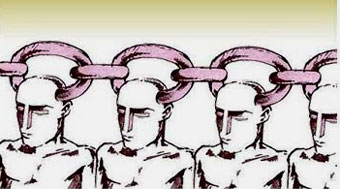 To stripe somebody of his individual identity to replace it with a new identity has been a common process in majority of all contemporary cults. This cult identity is created by sophisticated mind control techniques and it does not represent the whole individual. Steven Hassan stresses that “[cult] members are taught to suppress negative personal thoughts and emotions. They are trained to speak only positively of their involvement. When the cult member says he is "happy," it is usually the cult identity who is talking. The cult self is doing what it has been instructed to do”. 1
To stripe somebody of his individual identity to replace it with a new identity has been a common process in majority of all contemporary cults. This cult identity is created by sophisticated mind control techniques and it does not represent the whole individual. Steven Hassan stresses that “[cult] members are taught to suppress negative personal thoughts and emotions. They are trained to speak only positively of their involvement. When the cult member says he is "happy," it is usually the cult identity who is talking. The cult self is doing what it has been instructed to do”. 1
As cults have developed their own principles and rules, their reactions to the outside world are based on some certain criteria different from that of other political and social organizations that have to exercise the discipline of their own in order to achieve certain objectives; however, rarely they make use of any process to forge identities. At the present, cults are largely in need of obedient and submissive members whose mentality can be shaped through a change of identity and our aim here is to take a brief look at the concepts of individual identity, cult identity and investigate the process of setting up new identity in MKO similar to that of other cults.
We may consider the individual identity as the sum of mental and ideological beliefs of a person and the extent to which he is affected by the environment out of the cult. On the contrary, the detachment of the person from such beliefs and values by means of a system controlling his behavioral, mental and psychological aspects constitute one of the major goals of cults. Such a replacement of values leading to a new cult personality makes the person struggling with many contradictions to adapt his potentiality in line with cult objectives. In other words, cult identity neutralizes the individual identity of the members. In fact all the cultist instructions depend on such a mechanism for actualization.
As such, cults make their best to recruit members with unstable identity and ready to acquire cult identity due to their political, emotional and familial discouragements in order to play the major role in the quantitative growth of cults. Under the impact of a new identity, members easily submit to cultic domination and whatever sacrifices for the cult causes. Eric Hoffer evaluates the factor of devotion based on the cult identity. He believes that the relation between these concepts may clarify the nature of members' full obedience to cultist instructions:
To RIPEN A PERSON for self-sacrifice he must be stripped of his individual identity and distinctness. He must cease to be George, Hans, van, or Tadao- a human atom with an existence bounded by birth and death. 2
1. Steven Hassan's Releasing the Bonds: Empowering People to Think for Themselves. FOM Press, 2000.
2. Eric Hoffer; The true believer, Harper &. Row, Publishers, New York, 1966, p.60.
